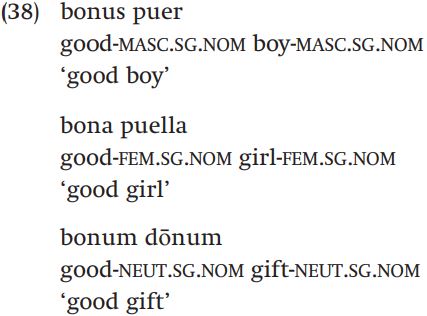


 Grammar
Grammar
 Tenses
Tenses
 Present
Present
 Past
Past
 Future
Future
 Parts Of Speech
Parts Of Speech
 Nouns
Nouns
 Verbs
Verbs
 Adverbs
Adverbs
 Adjectives
Adjectives
 Pronouns
Pronouns
 Pre Position
Pre Position
 Preposition by function
Preposition by function 
 Preposition by construction
Preposition by construction
 Conjunctions
Conjunctions
 Interjections
Interjections
 Grammar Rules
Grammar Rules
 Linguistics
Linguistics
 Semantics
Semantics
 Pragmatics
Pragmatics
 Reading Comprehension
Reading Comprehension|
Read More
Date: 2023-09-25
Date: 2025-02-11
Date: 24-1-2022
|
Inherent versus contextual inflection
Consider the Latin phrases in (38):

In each of these phrases the adjective and noun agree in number, gender, and case. As you can see, the adjective ‘good’ can occur in any of the three genders, depending on the context in which it occurs. The nouns ‘boy’, ‘girl’, and ‘gift’ are always, however, respectively masculine, feminine, and neuter nouns. In other words, the inflectional category of gender is inherent in nouns, whereas it is contextual in adjectives.
Put more generally, contextual inflection is inflection that is determined by the syntactic construction in which a word finds itself, whereas inherent inflection is inflection that does not depend on the syntactic context in which a word finds itself. Number is inherent in nouns and pronouns, as is gender. But the case of a noun always depends on its syntactic context. On the other hand, tense and aspect are inherent in verbs, but person and number depend on the nouns or pronouns with which a verb occurs in a sentence. So number can be contextual for one category (verbs) but inherent for another (nouns).
|
|
|
|
"إنقاص الوزن".. مشروب تقليدي قد يتفوق على حقن "أوزيمبيك"
|
|
|
|
|
|
|
الصين تحقق اختراقا بطائرة مسيرة مزودة بالذكاء الاصطناعي
|
|
|
|
|
|
|
قسم شؤون المعارف ووفد من جامعة البصرة يبحثان سبل تعزيز التعاون المشترك
|
|
|